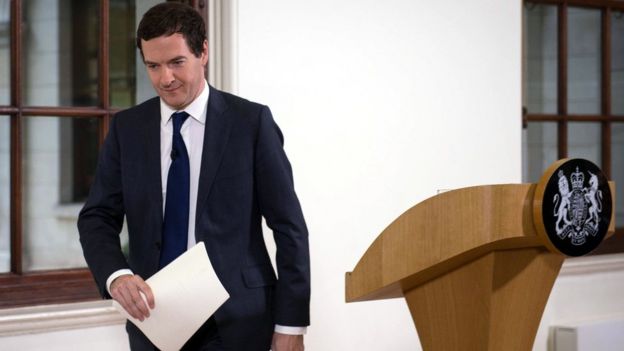George Osborne has said the UK is ready to face the future "from a position of strength" and indicated there will be no immediate emergency Budget.
The chancellor said there would still be a need to "adjust" the economy, but said it was "perfectly sensible to wait for a new prime minister" such action.
Mr Osborne's comments, his first public statement since the referendum result, were aimed a calming financial markets.
However, the FTSE 100 and the pound have continued to fall sharply.
- Follow the latest developments on our live page
- Kamal Ahmed: Osborne - juggling daggers
- Corbyn unveils new team after walkouts
- Johnson pledges EU co-operation
Mr Osborne said: "I said we had to fix the roof so we were prepared for whatever the future held and thank goodness we did," he said.
On the process of the UK's departure from the EU, he said: "Only the UK can trigger Article 50. And in my judgement, we should only do that when there is a clear view about what new arrangements we are seeking with our European neighbours.
"In the meantime, during the negotiations that will follow, there will be no change to people's rights to travel and work and to the way our goods and services are traded or to the way our economy and financial system is regulated."
Despite the comments, the FTSE 100 extended loses in late morning trading, with bank, airline and property shares tumbling.
Meanwhile, sterling hit a 31-year low, and yields on 10-year government bonds sank below 1% for the first time.
The chancellor's statement came as the repercussions of the Brexit vote continued to shake the UK's political system.
 PA
PA
The opposition Labour party has seen 14 of its senior members resign since shadow foreign secretary Hilary Benn was sacked in the early hours of Sunday after he told Mr Corbyn he had lost confidence in him.
The latest front-bench resignations, on Monday morning, are by shadow foreign minister Diana Johnson, shadow civil society minister Anna Turley and shadow defence minister Toby Perkins.
In response, Labour leader Jeremy Corbyn has announced a reshaped shadow cabinet, but he still faces a potential no-confidence motion from Labour MPs.
Analysis: Kamal Ahmed, economics editor
From Project Blimey This Is Scary, welcome to Project Reassure. George Osborne made a deliberate attempt this morning to soothe twitchy markets - the fundamentals, the chancellor insisted, have not changed.
The problem with the "steady as she goes" mantra is that markets do not wait for politicians.
As with the Exchange Rate Mechanism crisis of 1992 and the financial crisis of 2008, pressure on currencies and on stock markets happens second by second, a clock not set by the stately desires of Parliament.
Sterling is sliding downhill this morning. Banking stocks alongside property and leisure stocks are all heading south, some at precipitate rate.
These moves were always likely to be the outcome if Britain voted to leave the UK. And there is not much "reassuring words" from the chancellor can do about that.
As far as the markets are concerned, nothing of substance has changed.
At the same time, Boris Johnson, widely seen as the most likely successor to Prime Minister David Cameron, has said the UK will continue to "intensify" co-operation with the EU following the country's vote to leave.
The leading pro-Leave campaigner said exit supporters had to accept that the 52-48 result was "not entirely overwhelming".
In other developments:
- Potential Tory leadership contender Boris Johnson says the UK will continue to "intensify" co-operation with the EU following the country's vote to leave
- Prime Minister David Cameron will chair the first meeting of the cabinet since the EU referendum result. It is not a political cabinet and Mr Johnson will not be there
- The executive of the 1922 Committee of backbench Tory MPs is set to meet to draw up the timetable for the Tory leadership contest
- German Chancellor Angela Merkel and French President Francois Hollande will hold talks later in Berlin to discuss the fallout of Brexit
- Scotland's First Minister Nicola Sturgeon says Holyrood could try to block the UK's exit from the EU
- The House of Commons petitions committee says it is investigating allegations of fraud in connection with a petition calling for a second EU referendum
Mr Osborne said he had spoken to Bank of England governor Mark Carney and that there were "well thought through contingency plans if needed".
He said he had also been co-ordinating with fellow finance ministers in Europe, the International Monetary Fund, central banks and the US Treasury Secretary to help markets cope with the shock.
"You should not underestimate our resolve," he said.
Mr Osborne said the referendum result was "not the outcome that I wanted", but added: "The British people have given us their instructions."
He also appeared to rule out resigning in the near future, saying that the UK needed to negotiate its exit from the EU with its "European partners and allies".
"I intend to play an active part in that debate," he said.
No comments:
Post a Comment